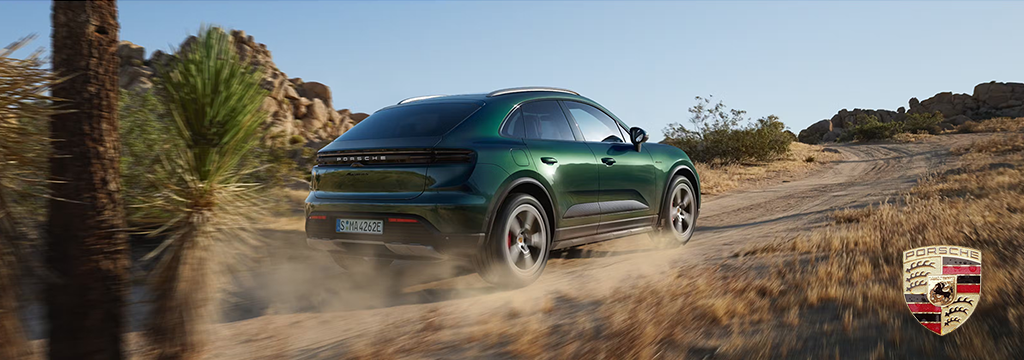
My nose my stekkerdoos: studio job for lensvelt. Milan 2013.
We were quite looking forward to talk to Job Smeets and Nynke Tynagel of Studio Job, whose creations can stress art as the counterpoint to design, can be wildly fun, unpredictable and we anticipated an equally lively chat. A healthy body of work affirms modernism though their sculptural translations also resemble sophisticated contraptionisms of time-traveling with Jules Verne. Tonight, Studio Job is presenting their new ‘Job Office’ collection for Lensvelt. The collection consists of a buffet cabinet, a desk, and an LED lamp and is an extension of the Job Cabinet launched by Studio Job in Milan 2011 – a metal cabinet with a single door that also comes with a gold-colored key. The venue, the refectory within the monastery within the Museum of Science and Technology. The walls and ceilings covered with beautiful 18th-century Sala del Cenacolo frescoes. ‘The Wall’ is our background music.
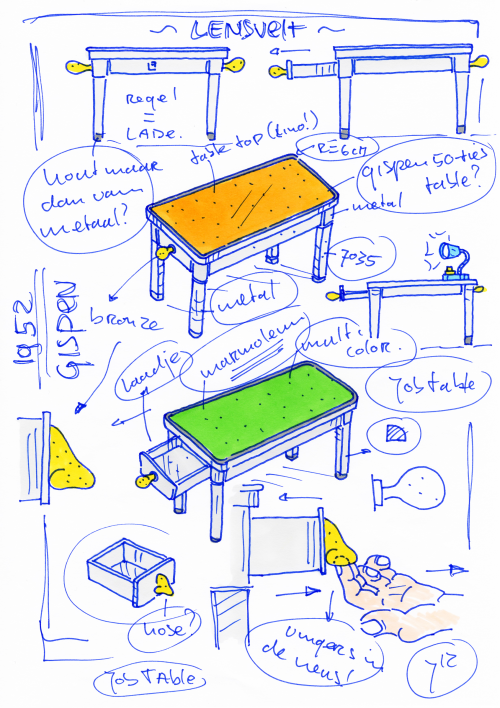
click > enlarge
>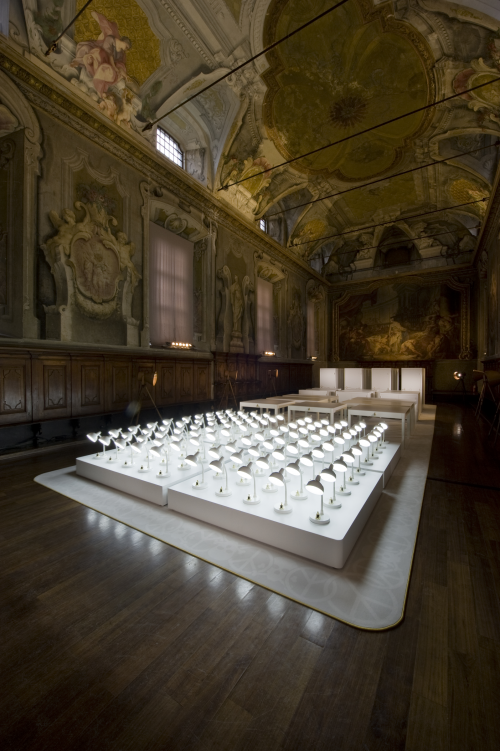
[DA] The chosen space is extremely surreal. And the installation’s teaser promotion is of famous people with golden noses. Job, please explain this concept for us.
[JOB] Do you know what stekkerdoos means?
[DA] Please tell us.
[JOB] The concept is ‘stekkerdoos’ translated from Dutch means multiple socket, in this case, my nose, my socket. And you know, I have a strange nose. In high school I was told my nose looked like a socket. But on the other hand, the nose is also a handle to open a drawer in an office desk.
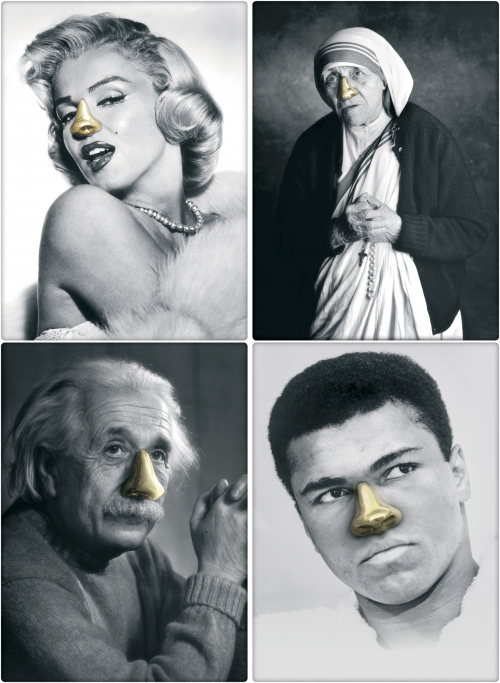
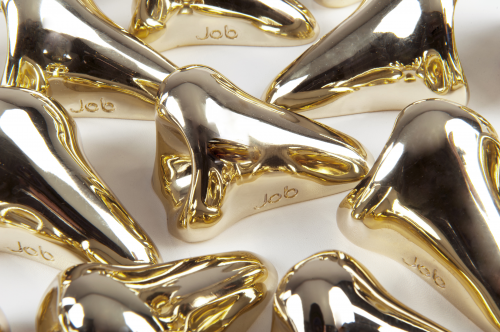
[DA] This is a story about turning a negative into a positive.
[JOB] I think so. Yes feel the handle, feel the nostrils. Finally you can open a drawer by putting your fingers in the nostrils and you don’t have to worry about your mother saying you can’t do that. After all these years.
[DA] An ultimate revenge.
[JOB] Yes, exactly.
[DA] When did you think of this concept.
[JOB] I knew it when I was 15. It just took 25 years to make it happen.
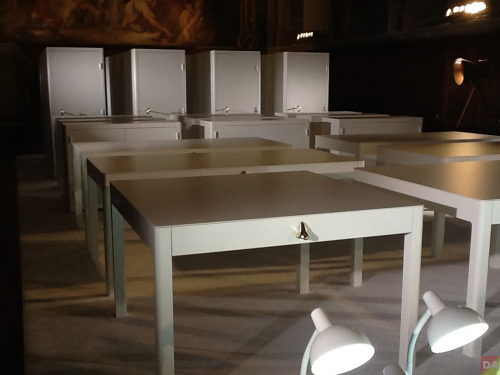
[DA] Tell us about the ‘Job Office’ collection.
[JOB] Lensvelt makes office furniture and people today are working more and more in their home. So we are trying to personalize this experience. These pieces are very modernistic, in a modern style, like this lamp that goes back to the 50s and we also merged a sculptural presence to the pieces. A merger of the right industrial product with the gilded sculpture.
[DA] The nose is a very organic statement and the gilded button is huge.
[JOB] Yes, regarding the nose I was looking for a handle and maybe we were looking for a human statement. An the most iconic thing about the lamp is this big on/off button. And there are 100 lamps in this installation celebrating 100 years of Lensvelt. Like a big KGB office with all these lights for interrogation.
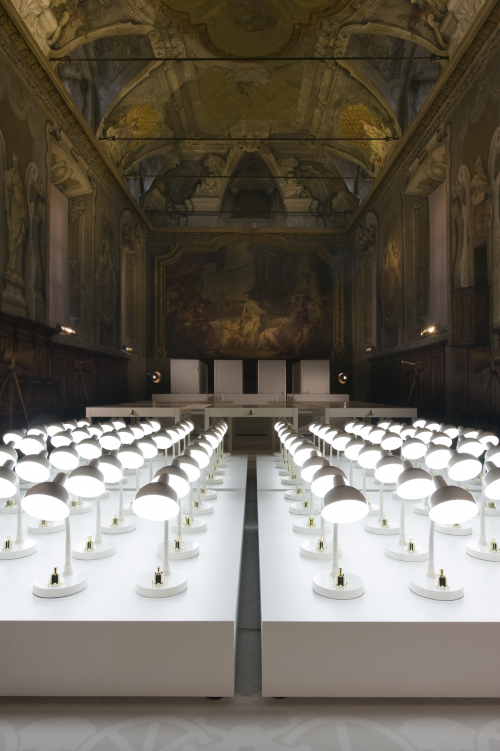
[DA] This space, this installation. Reminds me of the crazy offices in the movie ‘Brazil’.
[JOB] Exactly. This reminds me of the Pink Floyd movie ‘The Wall’ where you could see all the hammers. That’s the reason for ‘The Wall’ background music.
[DA] How does humor play into your design concepts.
[JOB] Humor is quite important. Human beings are already too serious, especially taking themselves too serious.
[DA] Several designers we talked to mention noise and chaos and they are providing ‘peace’ and ‘natural’.
[JOB] Peace and natural is not new in design. All of us are just mirrors. I feel our design is reflecting what we are up to and our environment isn’t that peaceful. And our environment is very surreal, it’s never what you think it is.
[DA] What expression are we looking for here. Something good looking?
[JOB] No. We must all admit that we are like those sparrows who try to steal the bling. We are all attracted to stuff that shines. And of course we are attracted to beautiful things and I like to play with that a little bit. But I’m not interested in aesthetics at all. I’m interested in how humanity functions, in the seducing quality of the bling bling. The sculptural aspect can be seen in our work: We have created a lot of huge gold sculptures. And the office is all about function and we about are looking for a fresh a personal look for office furniture.
[DA] Is there a sustainable aspect of the office collection.
[JOB] Sustainable is important but the term is a marketing term. What we do is make unique pieces that are well made, and some of the pieces cost quite a bit. These pieces will be handed down from generation to generation, never thrown away. Some are museum quality and they will last a long time. It could be that 100 years from now there will be more Studio Job products around than Ikea and they are so much bigger.
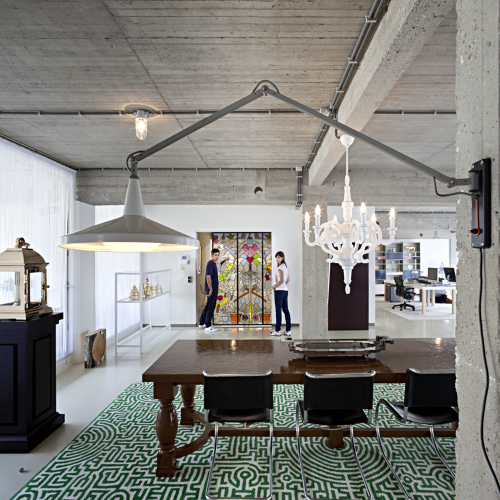
job and nynke in the studio | photo: t. wolzak
[DA] What is your office environment like?
[JOB] Nynke and I work in a concrete environment, like a bunker. We are surrounded by modern design from the 50s and 60s. I like the period a lot, the post war reconstruction period. If I had lived in the 50s our work would reflect that period. I’m sure if Pierre Jeanneret or Jean Prouvé lived today their work would look so different. That’s what I mean about reflecting time, the work is really a diary. It’s such a tragic thing to be a designer when the only thing we can do is dematerialize. But this can be inspiring, if you can be as less a designer as possible and maybe make art. The conflict of design and art is quite interesting.
[DA] Everything here tonight for Lensvelt are production pieces. Though your body of work includes a great deal of collectables.
[JOB] Studio Job is in the collections of maybe 40 museums. And we have many solos exhibitions around the world. So we enjoy and thrive on limited edition sculptural pieces but we are also invited by producers to create production objects.
[DA] Is the function different with limited vs production.
[JOB] It can be. It really has to do with the working with the brands and their objectives. But our mindset is to push the solutions as far as we can. I see this philosophy in fashion, in haute couture, which has a strong sculptural aspect to it. And haute couture inspires the creation and production of products which still possess the sculptural quality but becomes more reachable to the larger audience.
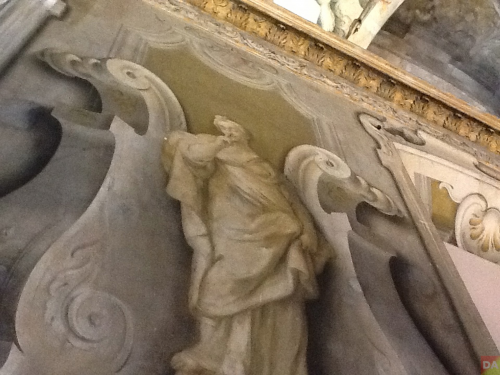
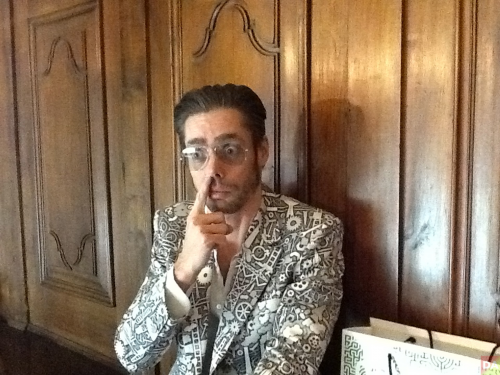
[ Dutch Profiles ] are short documentaries about architects, graphic, product and fashion designers in the Netherlands. The series debuted in 2009 and there are currently 85 videos plus 10 in production to date.
[ milan 2013 ] 1/7> job office collection | lensvelt | 20138/9> underworld | nodus | 2013
26> paper patchwork wardrobe | moooi | 2013
27> paper patchwork table | moooi | 2013 [design miami basel 2013 ] 10/12> chartres | carpenters workshop gallery | 2013
13/15> black cat | carpenters workshop gallery | 2013 [ neocon 2013 ] 16/17> aftermath | maharam | 2013
18> bavaria | maharam | 2013
19/21> art defender | jaguar land rover | 2013
22/24> scenography | viktor & rolf | 2013 | photo: p. stigter
25> paper patchwork collection | moooi | 2013
28/30> studio job house, kempen | 2011 | photo: r. kot
31/33> firmship fs 42 | 2011
34> studio job gallery antwerp | 2009 | photo: r. kot
35> studio job atelier, netherlands | 2013 | photo: blommers/schumm
36> nynke tynagel | job smeets | 2013
[ studio job ] [lensvelt ] [ salone internazionale del mobile ]
